(Upcoming appearances: October 24, 7–9, All-Hallows Emo Night, Badsons Beer Co., 251 Roosevelt Dr., Derby CT (tickets here) | November 15, 11–2, Hagemann Memorial Author Showcase, East Haven Senior Center, 91 Taylor Avenue, East Haven, CT)
Back in the ’80s, Piers Anthony was a juggernaut of the SF section. His impressive back catalog and daunting new-release schedule guaranteed him a full shelf or two at your local B. Dalton. A couple decades later (long before the present moment) he had become an embarrassing relic, his books out of print, his name a punchline.
Unlike SF darlings of slightly later eras, such as Neil Gaiman (accused rapist) and Orson Scott Card (the gay marriage thing), Anthony has had no one moment in which he fell from grace. People just started getting squicked out by his books.
It may be that the books are, and always have been, rapey; the public’s growing perception of their rapiness turned the its eye away from him. It may be that his books are, and have always been, full of sexualized young girls; the further in time society moved from the liner notes to Nancy Sinatra’s Boots album (see image below), the less acceptable sexualizing young girls became, and society shut it down.
These analyses are not, I think, incorrect, but they do not quite hit the mark. Neither is what the standardized tests would call the best answer. The back half of the twentieth century is fulled with gross texts that are gross because they’re rapey or gross because they’re “pedo-ey,” but not all of them have disappeared down the drain Anthony’s books have. I can still listen to Nancy Sinatra without feeling weird; I just ignore the liner notes; who can read Piers Anthony now?
This essay will be an attempt to tease out the best answer. It will also, incidentally, explain why Anthony’s fan base skewed towards young teenagers. You may have noticed already, but perhaps have not been able to pin down specifically, the fact that Piers Anthony books feature a weird sexual peccadillo—I say weird not judgmentally, as I don’t want to kink shame, but just to indicate it is something not often made explicit in mainstream American literature—I mean, the kind of books you could buy at B. Dalton in the ’80s.
Remember, I’m not calling Piers Anthony a pervert. I don’t know anything about P.A. (outside of what he has revealed in his 2.5 volumes of autobiography). He has stated or implied more than once (Anthonology p. 245; Bio of an Ogre p. 208) that the sexy element in his work is due to “the market.” So forget about P.A.: It’s his books, that are perverted! Their author’s shifting fortunes are merely a metric of how badly his readers wanted to indulge in their particular perversion.
Let me say right here at the outset that, despite a cruel and acerbic tone I have trouble shutting off, I bear Anthony no ill will. I have loved his books and hated his books (depending on my age), but I am trying to be dispassionate here; I’ll save my vituperation for other authors and other books. Personally, I think he does have some quality work that stands up well: Mute, On a Pale Horse, maybe Orn or Night Mare; and even his weaker books (and I’ll admit he has some real stinkers) often have interesting ideas. His first novel, Chthon, was a finalist for the Hugo and Nebula, Macroscope for the Hugo. In an alternate reality, Anthony would be remembered as a minor post-new-wave writer with a few hidden gems. Maybe time, that thief, will drag him around to that verdict eventually. But at the moment…well, here we are.
I must warn that the following paragraphs contain really quite a lot of discussion of sexual assault, rape, and sexualized violence, and although I’m not going to linger lovingly on the details, maybe I’ll be quoting someone who does.
Start here, in the very first Xanth book:
•A Spell for Chameleon (1977)
This is the key text to understanding Piers Anthony’s work, and therefore his rise and his fall. I know people often skip block-text quotes, so I’ll summarize what follows right below it, but honestly this one is important—maybe try to wade through the whole block. For context: Bink is riding on the back of Cherie the centaur, and she says…:
“Now hang on. There’s a trench ahead I have to hurdle.”
Bink had been relaxing, but now he leaned forward again and clasped his hands tightly around her waist. She had a sleek, comfortable back, but it was too easy to slide off. However, if she weren’t a centaur, he would never have had the nerve to assume such a position!
Cherie picked up speed, galloping down the hill, and the motion made him bounce alarmingly. Peering ahead under her arm, he saw the trench. Trench? It was a gorge, some ten feet across, rushing up at them. Now he was more than alarmed; he was frightened. His hands became sweaty, and he began to slide off the side. Then she leaped with a single mighty spasm of her haunches and sailed up and across.
Bink slipped further. He had a glimpse of the stony bottom of the trench; then they landed. The jolt caused him to slide around even more. His arms scrambled desperately for a more secure hold—and wandered into distinctly awkward territory. Yet if he let go—
Cherie caught him around the waist and set him on the ground. “Easy,” she said. “We made it.”
Bink blushed. “I—I’m sorry. I started to fall, and just grabbed—”
“I know. I felt your weight shift as I leaped. If you had done it on purpose, I’d have dropped you into the trench.” And in that instant she looked uncomfortably like Chester [another, meaner centaur]. He believed her: she could drop a man into a trench if she had reason to. Centaurs were tough creatures!
“Maybe I’d better walk now.”
“No—there’s another trench. They’ve been opening up recently.”
(pp. 30–31)
As promised, here’s a summary of the text above: While jumping over a gorge, Bink accidentally grabs Cherie’s breasts. It wasn’t his fault.
That’s the key to the scene. It wasn’t his fault. Unlike a fratbro at Woodstock 99 groping a crowd-surfer, Bink is innocent. And in fact, he only survives because he is innocent! The guilty get dumped into a gorge (!) that has just opened up (!!). Make of that what you will, Freudians!1
One thing that’s interesting here is that it’s unclear if Bink actually enjoyed his second-base experience. He’s terrified, after all! If I may indulge in some foreshadowing: It’s like a gratuitous shower scene in an anime: The cat-maid isn’t getting her jollies off taking the shower, as she’s just taking a shower; and there’s no one else there. The only one getting stimulated is the camera. The performance is only for the audience.
Now, there’s nothing particularly weird about this scene, and it could appear in any number of novels and pass without comment. But the more Piers Anthony books one reads, the weirder the scene appears. Because a scene much like it appears again and again. The books craft complicated or baroque justifications for why a character—the hero, and male—must go through some kind of sexual encounter and come out the other end saying it wasn’t his fault. Sometimes (as here) it is an accident. Sometimes the character has no choice. Sometimes both!
Bink’s experience is unusual if not unique because it gives a peek into what happens to people whose fault it is. Usually this part is left unstated. All that is left is the innocence. But surely the anxiety is always there? There’s always the danger of the Gap Chasm.
What follows in the paragraphs below is a whirlwind tour of Piers Anthony’s oeuvre in chronological order, or at least a tour of eight scenes that match our summary above. We will restrict ourselves to moments when a character—the protagonist—is compelled to sexual activity through forces beyond his control. This is not just the common motif of a passive male hit on by a manic pixie or sexually aggressive woman: This is about having no choice. Not necessarily because the male character is raped, but perhaps because the greater good requires the character to go through with something he would otherwise have been too much of a gentleman to do.
These examples can be deadening after a while, so feel free to skip ahead to the conclusion.
•Macroscope (1969)
Here’s the scenario: Four characters, including young Ivo and his crush, the beautiful Afra, are, for plot reasons, about to use a teleportation method that breaks down and reassembles the body. Afra is afraid that she will be reassembled as a different person and so demands that someone grope—“handle” is her term—her so that they will know if the self that is reassembled after the teleportation is indeed her. Will Ivo fondle the woman he’s crushing on?
“I couldn’t tell one girl from another, by touch,” Ivo objected, feeling his own face heating.
“Do it,” Groton [another of the four characters present] muttered.
“Me?”
Groton nodded.
(p. 162)
What follows is page after page of Ivo hesitating to touch Afra and Afra forcing him, quite physically, to. “She caught his hand and jammed it against her midriff”—that’s how it starts. Soon: “She grabbed at his hand again and lifted it in both of hers forcing his fingers to uncurl. ‘Here?’ She plastered his right palm against her left breast.” This is followed by: “‘Here?’ she demanded again, and rubbed his fingers against the firm lower crease of her left buttock…Ivo snatched his hand away.” [Ellipses in the original.]
I cannot stress enough how long this scene goes on for. Ivo is pressured from all sides, so he eventually squeezes and prods every inch of Afra’s lovely flesh. Don’t worry, though: “He touched her pubic hair and passed over it lightly, finding no more reason to probe within it than he had to feel the insides of her ears, nose or mouth.” This goes on from page 161 to 166. Also notice that he’s doing a real service for Afra here. “Confirmation by tactile sensation—very important,” approves Groton (p. 161).
Ah, you may be objecting, but this is scene just a weirder and more juvenile version of a strong come-on. You’ll have to produce something far weirder to persuade me.
Well, the next one has a far more importune sexually aggressive woman. It involves an even more important real service. And, yes, it is weirder.
•“The Bridge” (1970)
In this short story, a 9” tall miniature dream girl shows up begging, quite literally, for sex. The first word of the story is “please,” and Minnie never stops saying please for the entire story. She wants to have sex with a normal-sized human, impossible as that sounds, because her vagina is a conduit to another solar system, the people of which need the protagonist’s sperm to survive. Hey, our hero is preventing extinction here! He has no choice! What a mensch! This particular benevolence is described in lushly pornographic detail that I will forbear to quote.
There’s an oddly objective nature to this good deed, though. The protagonist does not know he’s saving a species: He thinks he’s just satisfying a mysterious 9” tell girl that shows up on his pillow one morning for no reason (as one does). He scoffs at the idea that “a great deal more had been at stake than an act of physical love between two people” (Anthonology p. 260).
But we, dear reader, know the truth.
•Var the Stick (1972)
Var’s girlfriend Soli has been captured, and is chained naked to a rock. Or as PA puts it: “Soli’s slender wrists were pinned within them [manacles] at shoulder height. She was naked, her lustrous black hair falling down around her shoulders, her small breasts standing erect, her rather well-fleshed thighs flexing nervously as she fidgeted about” (p. 308 of the Battle Circle omnibus, from which all Var quotes here on in are taken). Soli is a virgin sacrifice to the half-bull “god” Minos, a creature made “by mutation and operation” to suffer from a certain predilection. He must deflower virgins, and such is the size of his member that the virgin inevitably perishes in the operation. Note that Minos is overall a swell guy, and it’s not his fault that he is a rapist killer. “That is the way I have been designed,” he explains (p. 313).
So Soli is chained and Minos is coming for her, and Var knows that Minos is so butch that any attempt to fight him is vain. Trouble for Soli! What happens next is…awkward.
Var threw himself on Soli as though to shield her from the onslaught of the god, knowing this to be futile but determined not to desert her. He held her close and tight though she fought him, tearing his clothing with her feet and teeth. Finally he got her body pinned firmly against the wall so that her legs split and kicked behind him ineffectively while she hung by the manacles. “I will not leave you,” he panted in her tangled hair.
Then her resistance collapsed, “Oh, Var, I’m sorry!” she sobbed. “I love you, you idiot.”
There was no time to be amazed. He kissed her savagely, hearing the tramp of Minos’ hoofs, the blast of Minos’ breath.
Desperately they embraced, experiencing what had been building for three years; compressing it all into these last moments. Sharing their love absolutely, exquisitely, painfully.
(pp. 316-17)
In case it was unclear what happened there, Var and Soli just had sex. Now that Soli is not a virgin, Minos is not interested in killing her with his penis, and he just ambles away.
You will note that Var didn’t really mean to do the deed—and anyway, he saved the girl’s life. It wasn’t his fault! It was for the greater good! And I repeat he didn’t mean to!
It’s all in there.
•Juxtaposition (1982)
Var’s experience was big. I want to bring out a small one now.
So a femme fatale named Merle has spent most of this book pursuing our hero, a man named Stile. She keeps putting him in situations where he has no choice but to sleep with her (or suffer dire consequences)…and then he still refuses! Subverting our expectations, that Stile. Okay, finally he does agree, but that’s not what we’re here for.
We’re here for an earlier scene in which, to deceive a crowd (and save Stile’s life), Merle is pretending she wants to kill Stile with a knife. Then they wrestle. It goes like this (the he and she in this quote are Stile and Merle):
He diverted the blade and fell with her to the floor. Her clothing ripped; she was half out of it. She scrambled over him; now he felt every part of her! Her teeth brushed his ear. “My bare bottom is driving Hoghead [a guy in the crowd] crazy!” she whispered with satisfaction as the seeming struggle continued.… “Voyeur’s delight,” Stile agreed, trying to catch a glimpse himself, but unable.…Actually, it was in its way enjoyable; Merle was a splendid figure of a woman, and she had a fine flair for drama. At the moment she was wrapping her bare legs about his torso, theoretically securing him for another stab with the knife.
(pp. 290–91)
This is just a fight, remember. It is a fake fight, put on to deceive Hoghead and a bunch of other people, but it is also deadly earnest (because, for complicated reasons, Stile’s life depends on making it look realistic). But somehow the whole fight is actually an erotic dance! Stile has spent so many pages refusing to have a sexual relationship with Merle, and three seconds into a knife fight he’s having a sexual relationship with Merle.
None of this is Stile’s fault, of course. He’s just trying to save his life. It’s not his fault that his opponent’s clothes fly off. This is what happens to a man who keeps saying no.
(Incidentally, although Stile does ultimately agree to sleep with Merle, he never actually does. Weird. The ultimate perversion.)
•Bio of a Space Tyrant: Mercenary (1984)
In case not having sex isn’t sexy enough for you, the Bio of a Space Tyrant books are all about having sex.
The Jupiter Navy of the future, for example, has not only a head (for physical relief) but also a tail (for a different kind of physical relief). That’s a pretty good pun! And just as you have to use the head, you have to use the tail, and on a weekly basis.
Why would anyone make such a rule? Well, a helpful c.o. explains:
It is…the opinion of the Jupiter Navy that the best soldier [sailor?] is a satisfied one. We do not care to have stifled sexual urges generating mischief in the ranks, so we see that sex is not stifled. Sexual expression is normal and healthy, and the Navy wants normal and healthy personnel. But this cannot be verified by a computerized test, and psychiatric charting is cumbersome and, in my opinion, unreliable…It is necessary to see sexual expression in practice.
(p. 35)
Also it weeds out the gays.2
Hope Hubris—eventual space tyrant, but just a Navy guy in this book—of course must visit the tail for his required dose of rational heterosexuality. But the first time he goes, after rejecting the usual hookers, he is placed with a sensitive soul, another fresh-faced naval recruit, just sixteen (like Hope) and female. They are required to have sex! The Navy commands them! But Hope, narrating his experience, realizes in weird free-verse (?) paragraphs that: “To her it was much the same as rape. ¶And I was to be the rapist.¶I turned to go, unable to continue with this” (p. 40).
But did I mention that he has no choice? Hope has no choice! The Navy is making him have sex with this cute girl!
So they do it and it is nice.
Throughout the book, for the rest of the book, Hope has no choice but to go to the tail periodically and have sex (lovingly described). Naval rules!
By the way, if this rule sounds strange to you—well, future Jupiter seems prescriptive in a lot of unexpected ways. This description of a woman (as an aside, descriptions of women in P.A. always sound something like this) comes from the next book in the series: “Her face was elfin, but her body was as finely formed as any could be without requiring an entry to a starlet career” (BoaST: Politician p. 199)…
…Requiring???!?!?
•Bearing an Hourglass (1984)
This book has a banger of an opening, at least for our purposes. On page two Norton meets a ghost, and before the chapter is over the ghost is begging Norton to sleep with his wife. It seems he needs an heir, and, as a ghost can’t father one. You see the favor Norton will be doing everyone?
Of course Norton nobly refuses to cuckold even a ghost, although the ghost, and to a lesser extent the widow Orlene, are begging him to. Instead Norton just hangs around the castle (!) feeling weird, so that night he has a nightmare, and…
He woke—and Orlene was there, her arm about his shoulders as she sat on the bed. Her warm breast pressed against his upper arm, soft through the material of her apparel and his. “Wake, wake, Norton, it’s all right” she soothed.
If she had a baby and it screamed in the night, even so would she comfort it—and what baby could be better off?
(p. 25)
Just a maternal bosom, nothing to see here. Or is there???!? the narrator leers at us. Is there???!?
You might think it’s a letdown, a chapter later, when they actually get down to business, and we learn “they made love often at first, then settled down to a pleasant routine” (p. 44), like healthy adults, until you remember that Norton’s here to father a child for a ghost, and not for his own jollies, so that’s all fine.
•Bio of a Space Tyrant: Executive (1985)
Eventually, quondam-Mercenary Hope Hubris gets out of the navy and into politics and becomes a space tyrant. Who’s going to force him to have sex now?
How about a mysterious agent named Q, who will only help him out if he agrees to her sex conditions?
They are not your usual sex conditions. In a pitch black room Q hits Hope with a pacification ray so he can barely move, strips him, and:
Now she got on me, her naked body straddling mine, facing toward my spread knees. Her thighs dropped down outside mine, her feet remaining on the floor, so that she was able to stand in her fashion. She took my member and guided it, slowly settling down on it, until all her weight was on me and the connection was complete. Still I did not move, obeying her unstated directive. She required my body to play with in her fashion; she had it.
Those hands reached down, caressed that portion of my anatomy that remained exposed, then moved on. One finger slid to the aperture below and nudged and pushed, and, lubricated by something, entered. I felt very much as if I were a woman, being entered by a man, especially considering the intimate contact above that site. That member of hers drove to its full depth etc.
(pp. 134–35)
According to Hope, “I had been accepting what was happening as if I were indifferent, also in the manner of a woman” (p. 135). It’s all very weird. There is a conveyor belt involved.
But you’ll notice that Hope Hubris never asked to have a finger up his butt! He never asked to be shown how it feels to be a woman! Q demanded it! His career was at stake! And the pacification ray! He had no choice!
Hope Hubris says in a later book: “As the Tyrant of Jupiter I had of course had dealings with the nations of Uranus” (BoaST: Statesman p. 112). Har har har.
•Wielding a Red Sword (Del Rey, 1986)
We are now fully in the decadent period of Piers Anthony books. I don’t mean they’re almost over—P.A. has another hundred+ novels left in him, and he will be cranking them out for the next forty years. I mean that by now the convolutions required to justify this strange perversion and preserve the hero’s innocence have reached new levels of implausibility, and I for one can not bring this little bark any further upstream. To wit:
Prince Mym has been betrothed to Princess Rapture, but he loves another, so his father the Rajah imprisons him in the Honeymoon Castle so-called. The Rajah sends Mym a concubine, but Mym refuses her, whereupon the Rajah chops her head off and mounts it on a tall spike. A second would-be concubine suffers the same fate, so Mym relents with the third. “I can not be the murderer of these lovely women,” he says, in italics. “Then he took the hand of the concubine, and brought her to his bed, and dispatched her maidenhead that hour” (p. 28).
Eventually (after many concubines) Princess Rapture herself gets sent to the castle, and she and Mym hit it off, but he still refuses to sleep with her.
They spent the night together as before [i.e. chastely]. This time Mym dreamed that he held her in his arms, as he was doing in reality, but the dream continued farther. He kissed her, and then he began to undress her, and her flesh was warm and silken-smooth, and he sought to possess her—
And wrenched himself awake. Reality had been mirroring his dream, and her body was open to his touch.
Why did you not stop me? he demanded.
“I tried—but couldn’t,” she whispered.
I never forced a woman in my life!
“Couldn’t—make myself protest,” she confessed.
(pp. 42–3)
What does it take to get laid in this town? Imprisonment, multiple decapitations, and somnambulism. That’s what I mean by a decadent phase.
•Conclusion
Now this list of relevant passages is very far from exhaustive, and you can easily find additional examples if you care to look. In the story “The Whole Truth” (1970), our hero is compelled to have sex with a woman to prove she is not a shape-shifting alien (Anthonology p. 243). It’s not his fault! Or: Hope Hubris is compelled to sleep with a spy to...well it’s complicated, but I guess it made sense at the time; as Hope tastefully puts it: “We did complete the act. I felt guilty, even as my fluid pumped into her body, because of my memory of Megan [his wife, whom he’s cheating on], but I knew it was necessary” (BoaST: Politician p. 159). Did you hear that? It was necessary. Such marvelous possibilities are always hanging in the air: “Maybe you’ll have to make love to me after all to make me tell [you what you want to know],” a beautiful woman teases Detective Subble (Omnivore p. 78); it doesn’t happen this time, but hey, it could!
And then there’s like the whole of Firefly, a book I could never bring myself to read, but it’s about an alien horror creature that uses pheromones to compel people to have sex. Dude, it’s not our fault; it was the alien! (I’ll put pp. passim for that one.)
You can see, I hope, why this kind of perversion (and remember, I am saying perversion non-judgmentally) would appeal to adolescents. The typical P.A. protagonist is perpetually turned on but unable to make a pass, which is a good description of a lot of teenagers. And yet the protagonist gets some anyway. Even when they’re not actually scoring, P.A. protagonists are just Macroscopically always accidentally pushed against or rubbing up against something sexy. Imagine if you’re trapped in a cave in another dimension with your crush, and she has to squirm past you in a tight space. Your crush “was unaware of the electrifying effect of a perfect breast as it touched a man, even sheathed as hers was by layers of clothing” (Orn p. 35)—but you know!
Note that the subterranean breast contact there was (Bink-style) an accident. And whenever such a thing is not an accident it is necessary. Whatever guilt or shame teenage readers might have about sex is obviated by these qualifiers. Sometimes they don’t even enjoy it; only we, the lucky readers, get to enjoy it.
(At this point, let us recall that the default euphemism for sex in Xanth is “the Adult Conspiracy” (Crewel Lye pp. 281 & obvs. etc.).)
Sex without choice is generally rape, of course. In Orson Scott Card’s foray into “don’t blame me, I had no choice” sex in Hart’s Hope it is explicitly rape, and I doubt anyone has ever called it otherwise. But P.A.’s characters are all in a pretzel, somehow simultaneously 1. having sex, 2. not meaning to, and 3. not raping anyone. I mean, sometimes they rape people. There’s a lot of rape in P.A., and I just left most of it out. But sometimes they walk a fine line that threads itself directly into an adolescent’s libido.
That’s why the books were popular, of course. So why are they no longer popular? Why do adolescents no longer need Piers Anthony? I mean, maybe they just grow up with fewer hang-ups these days, what do I know? Or maybe they are illiterate. But for the maladjusted bookwormy SF fan—of whom there must still be many…
I think the answer is clear: that nerds who want an oops-I-touched-a-boob vicarious experience can get it from manga or anime. The same esthetic, the same perversion, appears again and again in a more varied and easily digestible form in Love Hina or I”s or [fill in your faves].
Imagine that I have made a graph with two lines: one of P.A.’s popularity (in popularity units over time), the other in availability of manga (in availability unites over time). You’ll see one steadily going down (until it bottoms out), the other steadily rising (until I guess it tops out; we’re at max, right?). Manga hit the mainstream sometime around 2004, after P.A.’s star had already begun to sink, but P.A. was never for the mainstream; these are nerd books for nerds; and as a nerd-American I can assure you that manga was crawling all over nerddom by 1990. In 1990 P.A. publicly choked by titling the most recent Xanth novel with a pun already used by Naura “Angry Red Planet” Hayden.
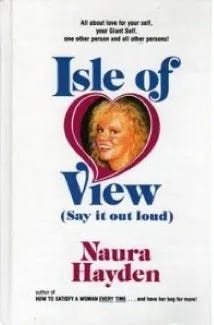
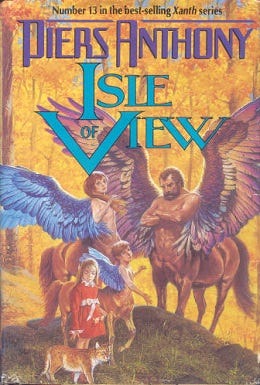
No one can survive a humiliation like that. It was all downhill from there, and meanwhile Viz is reprinting Urusei Yatsura comics; Shinobu is taking a bath; hope no one walks in on her by accident!
Uh oh! Someone walked in on her. But he didn’t mean it.
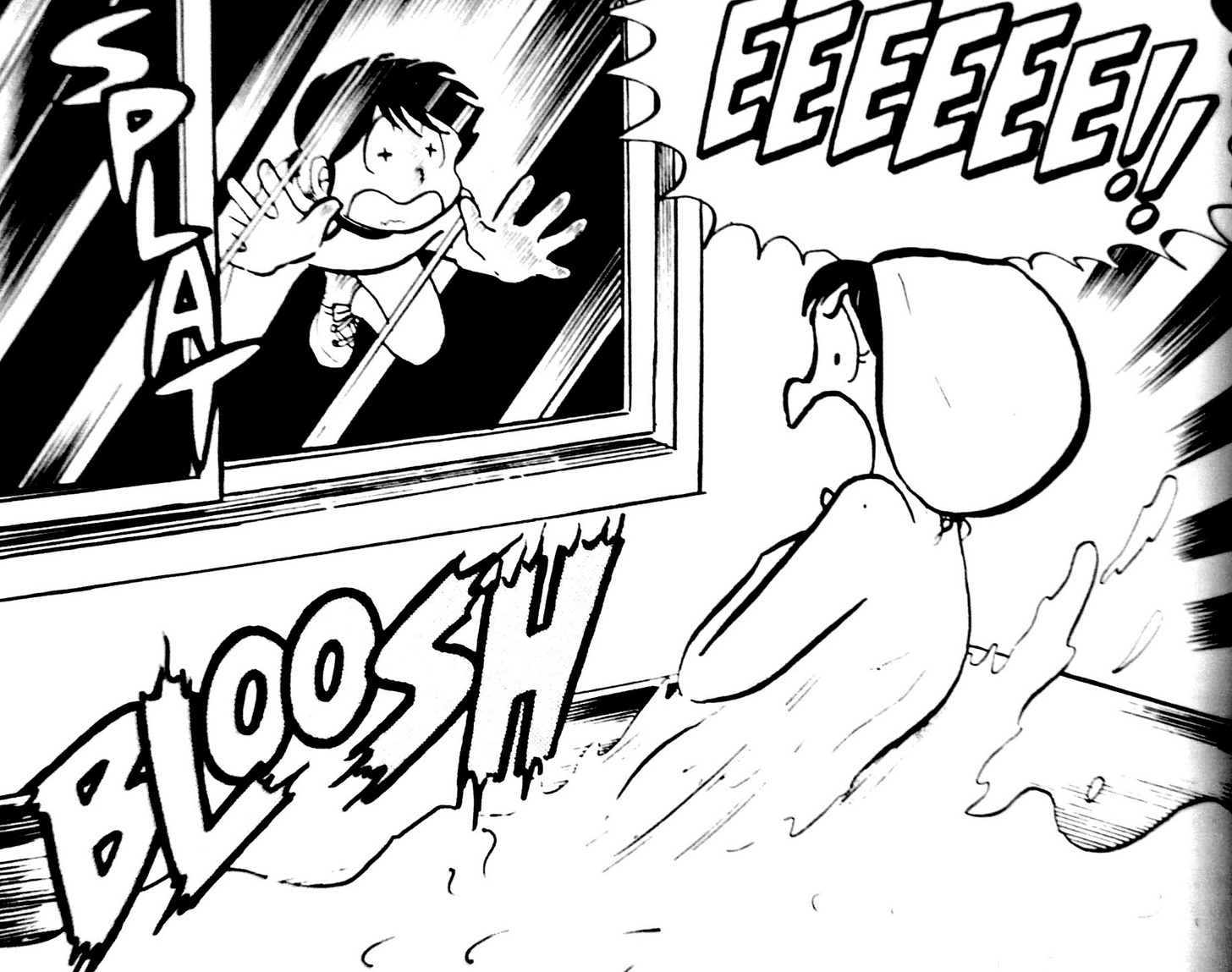
•The editions used, provided for page-number reference purposes
Anthonology (Tor, 1986)
Battle Circle (Avon, 1978)
Bearing an Hourglass (Del Rey, 1985)
Bio of an Ogre (Ace, 1989)
Bio of a Space Tyrant: Executive (Avon, 1985)
Bio of a Space Tyrant: Mercenary (Avon, 1984)
Bio of a Space Tyrant: Politician (Gregg Press, 1985)
Bio of a Space Tyrant: Statesman (Avon, 1986)
Crewel Lye: A Caustic Yarn (Del Rey, 1985)
Juxtaposition (Del Rey, 1984)
Macroscope (Avon, 1969)
Omnivore (Avon, 1978)
Orn (Avon, 1971)
A Spell for Chameleon (Del Rey, 1984)
Wielding a Red Sword (Del Rey, 1986)
Sudden Glory
“Oscar was not sure what to do with his time, so he tried looking to books for advice. He knew that patriotism, according to Emerson, was the last refuge of the scoundrel. He also knew that violence, according to Asimov, was the first refuge of the incompetent. Oscar took out his datebook and wrote ‘violence’ in the morning and ‘patriotism’ in the eveni…
Note that the Gap Chasm, the largest yonic symbol in all of Xanth, is introduced for the first time in the chapter following this passage.
This is neither a joke nor an exaggeration; it is in the text.



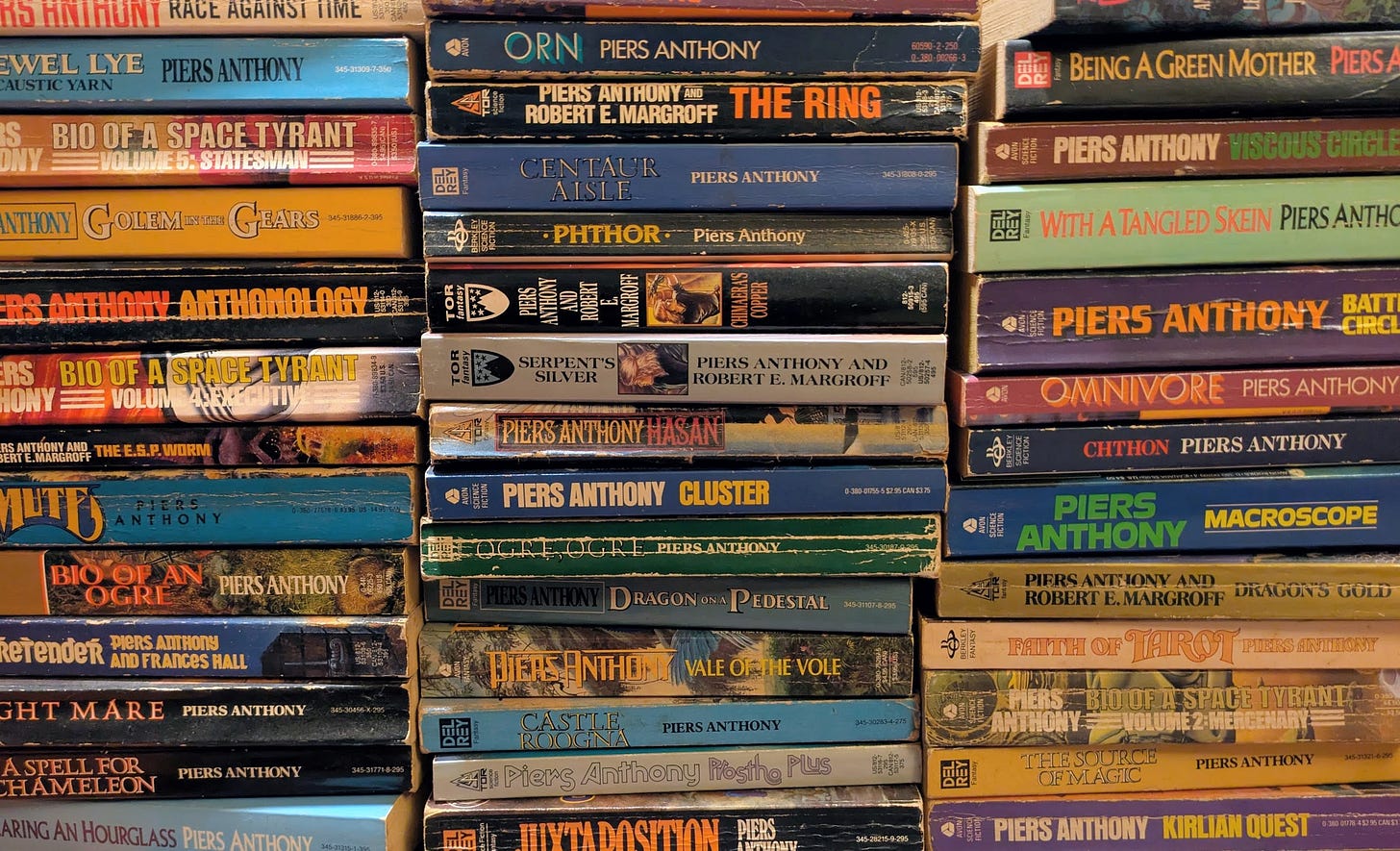
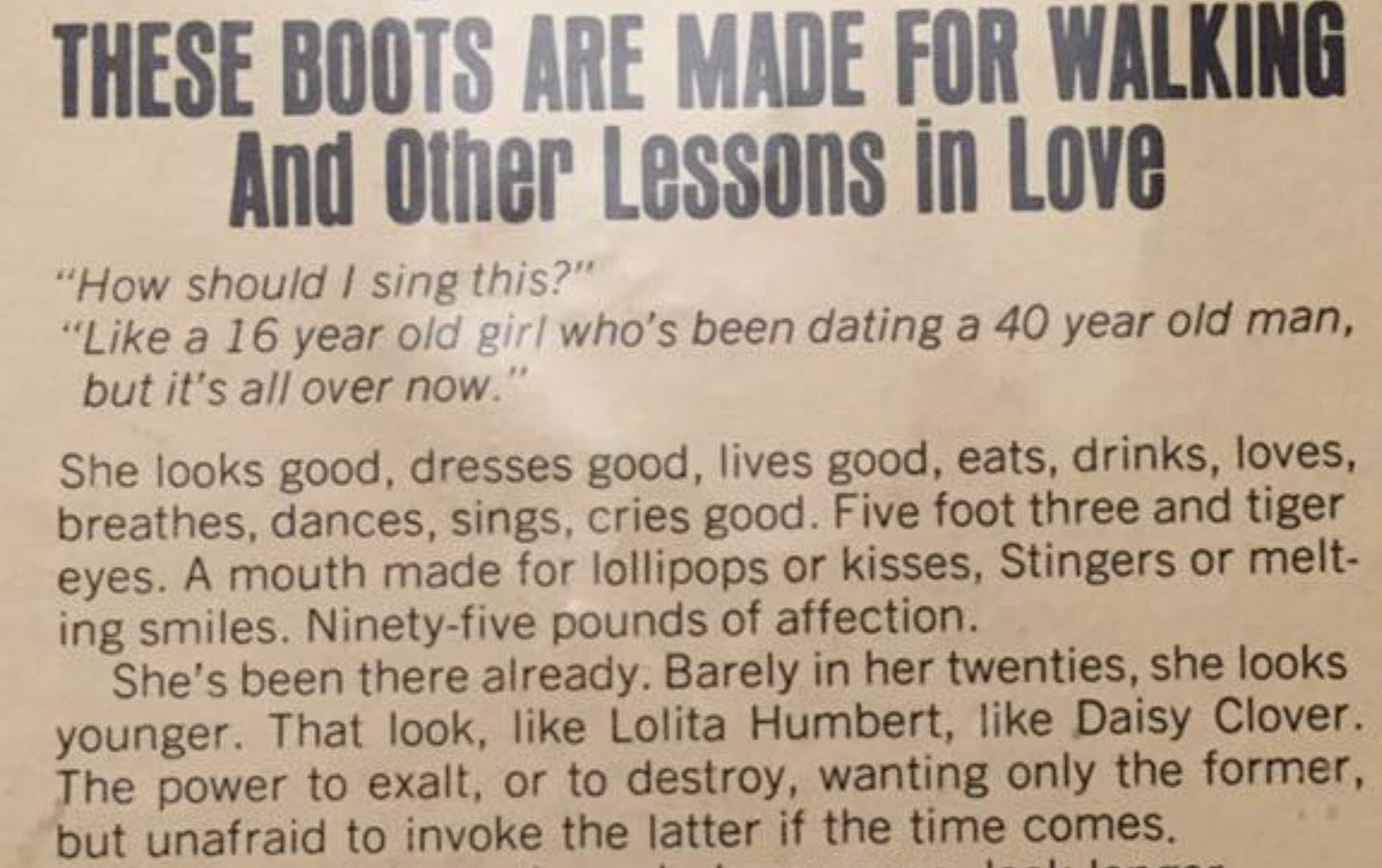

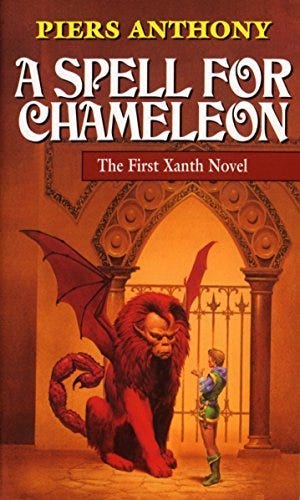
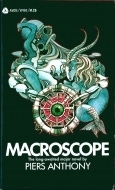

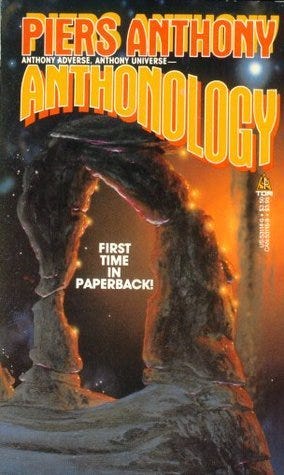
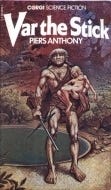
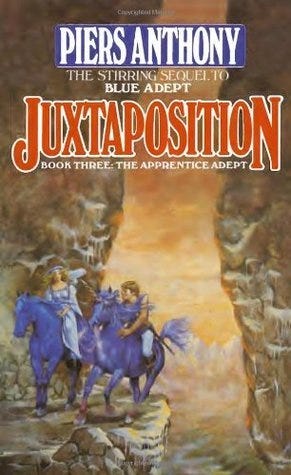
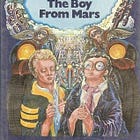
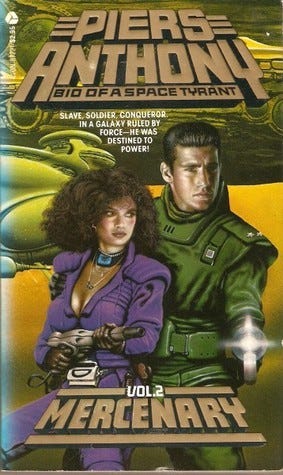

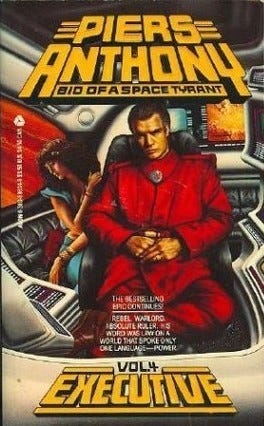
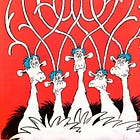
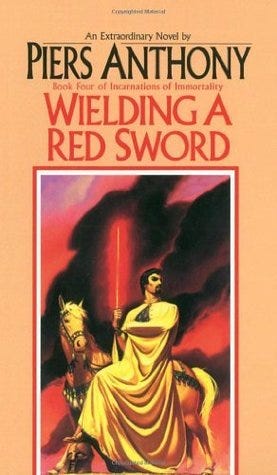
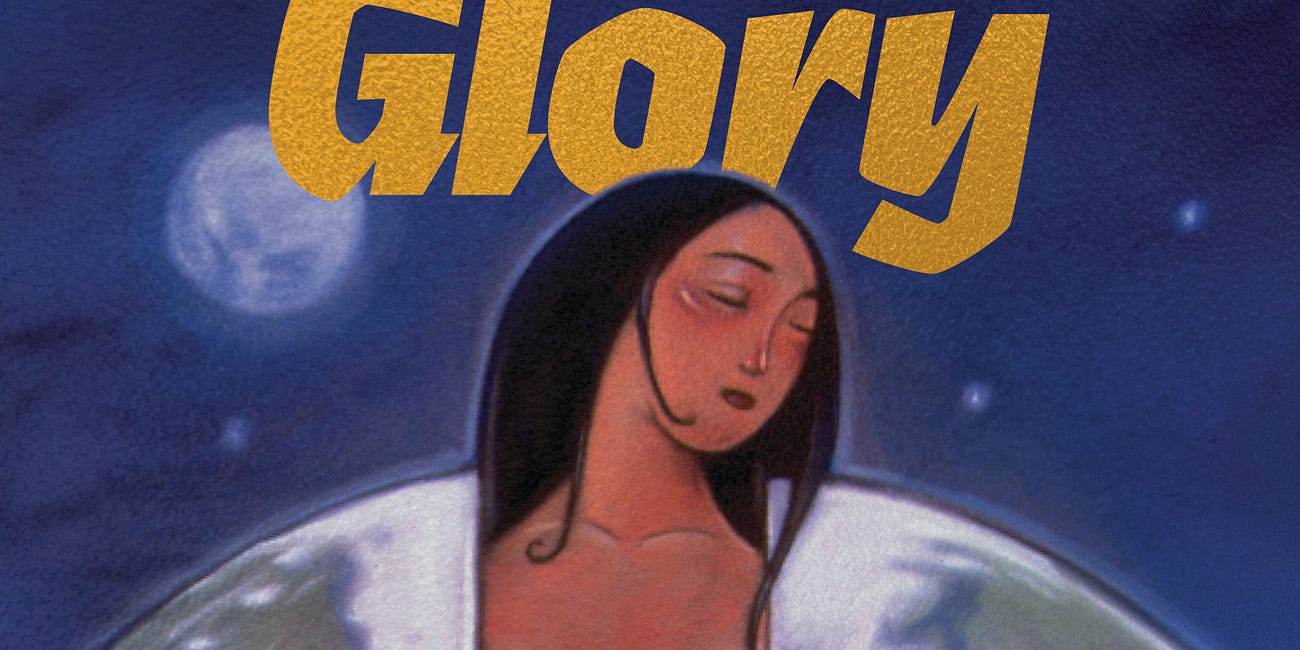
Passively active or actively passive...
Glad you brought up Manga and thus by extension: Anime. As I was reading this I immediately went to the typical manga/anime harem... The hapless "hero" unable to fathom why the gals are into him, and competing with one another over him. It's much the same. So to some extent I accept the hypothesis that as these became ever more available - P.A.'s star shrunk.
But as you note the heavy overlap seems like a contra indication. Perhaps as Gibson said: the future was already here, just not evenly distributed.
Piers wants his characters to have active sex lives, I guess...